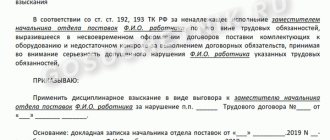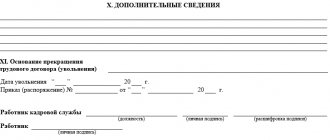What is improper performance of official duties?
The law provides that the administration can impose penalties for failure to fulfill or improper performance of labor duties. Let's look at what this means in practice:
- When drawing up an employment contract, certain agreements are reached between a citizen and his employer, which are recorded in writing and signed by the parties.
- An employee’s activities are regulated by a number of documents, namely an employment contract, job description, regulatory, and local documents of the enterprise. They clearly prescribe the sequence of actions when performing each specific operation. The employer is obliged to familiarize the employee with them against signature during briefings.
- In the future, deviation from the designated standards, or ignoring them when performing labor functions, will be considered a failure to fulfill official obligations.
- Each fact of non-fulfillment of labor duties must be documented and reviewed by the employee’s immediate supervisor. Further, depending on the conditions and degree of harm caused, a decision is made on the need to bring the worker to disciplinary liability.
Remember, non-fulfillment or improper fulfillment of the functional obligations of a particular employee can be proven only if these obligations were communicated to him in a timely and proper manner.
Validity
If an employer brings disciplinary action against employees, then he must follow the requirements of labor legislation, otherwise, with the help of a court, a specialist can challenge the reprimand as a disciplinary sanction. The nuances are connected not only with the reason for the commission of the offense, but also with the timing of prosecution. Therefore, the following rules are taken into account:
- an employee can only be held accountable within a month after a violation on the part of the hired specialist was discovered;
- if a citizen committed an offense on January 15, but the employer discovered the negative consequences only on May 1, then disciplinary action can be applied until June 1;
- if a violation is discovered not by the head of the enterprise, but by representatives of the fire inspectorate, tax service or other government bodies, then the day the violation is discovered is the day when the director gets acquainted with the results of the inspection;
- if the violation occurred more than six months ago, then it will not be possible to hold the employee accountable, although an order can be issued to compensate for the material damage caused;
- Disciplinary action is valid for one year.
Any director of an enterprise can lift a penalty before the established deadline. Typically, the procedure is carried out on the basis of a petition drawn up by the employee or his immediate supervisor. A reprimand for improper performance of duties is not reflected in the work book. An example of an order on the basis of which violators are held accountable can be studied above.
Purposes of using a reprimand
A reprimand is a fairly serious disciplinary sanction. After its announcement, the employee may be deprived of certain privileges, monetary payments, and create the basis for his further dismissal at the initiative of the administration.
But this is not always the main purpose of a reprimand. By announcing such a penalty, the administration wants to influence the employee’s behavior in such a way as to avoid similar violations in the future. Based on this, the purpose of issuing a reprimand can be viewed in the following way:
- recording incorrect employee actions for the future;
- measure of influence on incorrect behavior;
- adjusting the employee’s approaches to fulfilling his job responsibilities;
- deterring the employee from more serious violations in the future;
- creating grounds for termination of further labor cooperation in the event of repeated neglect of the performance of labor functions assigned to the employee.
Remember, in most cases, a reprimand has an educational function aimed at changing the employee’s behavior in the workplace.
Reprimand procedure
If an employee refuses to perform job duties or treats them irresponsibly, the employer must adhere to the algorithm for applying disciplinary action in the form of a reprimand:
- Record the fact of violation in the relevant act. It must be signed by two witnesses. They may be other employees.
- Request an explanatory note from the subordinate. He must provide it within two working days. If this was not done, the employer draws up a statement of lack of explanation.
- Draw up an order to issue a reprimand, indicating the reason, basis (a memo from another employee or an explanatory note from the violator), and the employee’s personal data.
- Give the order to the employee for review. He must put his signature on it. If he refuses to sign on it, a corresponding act is drawn up.
The basis for conducting a preliminary check before applying a penalty may be reports from other employees. Most often, they occur if the offender shifts his responsibilities to them, is often absent from the workplace for a long time, or does not do his work at all.
“At the initial stage, the manager must understand whether the actions of the subordinate are a violation or not. To do this, he needs to demand an explanatory note, and after analyzing the situation, make a final decision,” explains legal consultant of BKR-Intercom-Audit A.V. Ivanov.
The order to issue a reprimand does not have a unified form, but must contain the following information:
- Grounds: the fact of the violation itself, as well as reports from other employees and the violator’s explanatory note.
- Description of the situation for which the subordinate is reprimanded.
- Who is responsible for executing the order?
- FULL NAME. and signature of the director and other responsible persons.
If an employee refuses to provide an explanation or sign an order, this cannot be an obstacle to imposing a reprimand.
Practical examples
To understand the principles of applying disciplinary action in the form of a reprimand, it is worth familiarizing yourself with illustrative examples:
| Examples | Alternative Liability Options | Manager's actions |
| An employee is late for work several days in a row. | Comment. It is followed by a reprimand | Imposing a reprimand after an oral reprimand |
| Incorrect preparation of documents, as a result of which minor damage was caused to the company’s budget (unfair performance of labor functions) | Rebuke | Reprimand, obligation to pay the deficiency. A deduction is made from the salary, but the amount does not exceed the norms established by law |
| Damage to the company’s reputation among the consumer market due to improper performance of labor duties | Remark or reprimand | Reprimand and educational conversation |
This is interesting: Is it possible not to sign a reprimand order in 2020?
If we consider the features of applying a penalty in the form of a reprimand, you should pay attention to this example:
Warehouse accounting operator Shulgina O.S. violated the deadlines for drawing up accompanying documents, which resulted in the company’s failure to comply with the goods shipment schedule. This constitutes dishonest performance of labor functions, for which the employer, guided by Art. 192 and 193 of the Labor Code of the Russian Federation, applied a penalty to her in the form of a reprimand, drawing up an order and giving it to the violator for signature.
Rules for applying a reprimand
Considering that a reprimand can have serious financial consequences for an employee, this procedure is clearly established at the legislative level. The sequence of actions is as follows:
- Detection and recording of violations . This could be a report from a colleague, immediate supervisor, an inspection report, or a fact of violation known within a specific department (for example, deliberate breakdown of a machine).
- Conducting a comprehensive investigation . Before moving on to the procedure for issuing a reprimand, it is necessary to understand the reasons why this happened. This is usually the responsibility of the immediate supervisor of the potential violator.
- Decision-making . At this stage, the manager who has the right to hire, having familiarized himself with all the materials of the internal investigation, the positions and arguments of the parties, must decide on the guilt of the violator (violators) and determine the punishment.
- Registration of collection . An order is signed, which the violators familiarize themselves with. The document is submitted for execution to the company’s HR and accounting department.
Remember, in most cases, the cancellation of penalties imposed on violators of labor discipline occurs precisely because of non-compliance with the algorithm and rules for announcing such penalties. Even if a violation actually occurred.
Who is authorized to monitor employees?
In order to issue a severe reprimand to a civil servant, it is necessary to conduct an internal audit. While the investigation is underway, the culprit may be suspended from work. Based on the results of the inspection, a decision is made to punish the employee.
A reprimand for a civil servant is issued for a certain period. If a civil servant repeatedly violates his job description, he may lose his position. This is regulated by Article 37, Clause 2 of the Federal Law “On the State Civil Service of the Russian Federation”.
Disciplinary punishment of an employee does not imply a mark in the work book, but only in the personal card of the worker, according to the decision of the manager. Such a record is made in order to monitor professional violations of employees.
A note in the work book about disciplinary punishment is made exclusively if it is dismissal. The reason for dismissal is indicated in the “work information” column. This record is certified by the head of the enterprise and sealed.
Go to The procedure for granting annual paid leave to an employee: registration rules
The most likely consequence of a reprimand is deprivation of the bonus, if the Bonus Regulations allow it. You cannot cut your salary. If violations continue to occur, the situation may be regarded as a systematic failure to fulfill job duties without serious justifying reasons and may result in dismissal. If an isolated incident was very rude, dismissal may follow immediately.
The head of the company can remove the reprimand early. For this purpose, a corresponding order is issued.
Improper performance of duties is a serious hindrance in any work. Timely and legal application of disciplinary measures will help maintain discipline in the team and a balanced attitude towards employees.
Free legal consultation
Moscow and region
St. Petersburg and region
KnowDelo.Ru - a portal for those starting a business
— not to pay incentive payments in whole or in part, if this is provided for by the organization’s local act;
— dismiss an employee in case of repeated (within a year) violation of labor discipline (clause 5, part 1, article 81 of the Labor Code of the Russian Federation).
Sample order
- Art. 41.7 Federal Law “On the Prosecutor’s Office of the Russian Federation”;
- Art. 29 Federal Law “On service in the customs authorities of the Russian Federation”;
- Chapter 4, paragraph 54 of the Disciplinary Charter of the Armed Forces of the Russian Federation, etc.
Persons regulated by these laws may be legally subject to severe reprimand. In any case, the employee cannot be reprimanded and recorded in his personal file, since information about the reprimand is not entered in his personal file. But you can add it to your personal card to track whether the employee has disciplinary sanctions.
- this may serve as a basis for deprivation of the bonus (if this is indicated in the Regulations on bonuses);
- in cases where the violations are systematic and the offender makes no attempt to correct the situation, two such suggestions may be enough to dismiss the employee - for example, in the case of regular absenteeism, or alcohol abuse.
The suggestion is valid for a year, after which the employee is considered not to have a disciplinary sanction, although the employer, if desired, can remove the sanction earlier by formalizing this action with a separate order.
That is, the proper fulfillment of labor duties and discipline is monitored by the immediate supervisor of each employee, who also draws up a report and brings it to the head of the enterprise.
In itself, the issuance of a reprimand does not carry any negative consequences for the employee; currently, disciplinary sanctions are not even entered into the work record book, as was previously practiced.
But there is one very unpleasant nuance here. If during the period of validity of the punishment, the employee again violates labor discipline and the management decides to punish him, then dismissal may be applied to him as a disciplinary measure, under the relevant article (repeated failure to fulfill official duties).
And even if the first reprimand was issued with irregularities in execution or not entirely fairly, and the employee missed the deadline for appeal, then dismissal for the second disciplinary offense will be completely legal.
In some other organizations, in which the Regulations on Remuneration provide for various incentive payments, such as bonuses, the imposition of a reprimand may entail deprivation of these payments, either for a period of one year or less. Everything will depend on what is stated in the local regulatory document itself.
Recording the fact of misconduct
The beginning of the procedure for bringing a negligent employee to justice is recording the fact of a violation. In most cases this is done this way:
- By drawing up a report from the violator’s immediate supervisor. Such a document must clearly indicate which norm of the instruction, contract, or regulatory document was violated.
- Based on the results of an inspection by authorized representatives of the company (occupational safety engineers, technical inspectors, auditors and others), or government agencies. A certificate or inspection report is drawn up, which also indicates specific violations of the technological or work process.
- After an audit of the financial and economic activities of the company. In this case, it is formalized exclusively by an act. Specific violations and financial consequences for the company are indicated.
- By obtaining additional information about the misconduct from explanatory notes and reports from co-workers, colleagues involved (directly and indirectly) in the employees’ misconduct. The provisions of instructions, orders, and decisions of company managers are also discussed here.
Remember, the list of sources for obtaining information about a violation is not limited by law. The main thing is that during the review process all the circumstances of the case are fully studied and an objective decision is made.
Ad Rules
The most typical example of a reprimand for improper performance of official duties is a reprimand for an offense that resulted in material damage to the enterprise or created a threat to the life or health of employees.
Before deciding to apply this type of punishment, such as a reprimand, the head of the enterprise must familiarize himself with the memorandum of the head of the structural unit and the explanatory note of the offender himself.
The report must indicate:
- Full name of the employee who committed the violation;
- date of incident;
- description of the event that occurred;
- petition for enforcement.
If it is not possible to document the fact of neglect of official duties, you can use the testimony of eyewitnesses and colleagues.
The explanatory note is drawn up in any form: the employee has the opportunity to present his version of what happened and indicate mitigating circumstances.
Article 193 of the Labor Code of the Russian Federation prescribes that the employee’s written explanation should appear on the manager’s desk no more than 2 days after the incident. If an explanatory note is not written, a corresponding act is drawn up, and the type of penalty is determined at the discretion of the head of the enterprise.
The penalty must be applied to the violator no later than a month after it is issued.
This period does not include:
- vacation;
- sick leave;
- the time required for the union to make a decision.
A reprimand can be issued within a maximum of 6 months after the offense occurred. If it is announced based on the results of an audit, audit or inspection of financial and economic activities, the maximum period for issuing it is 2 years after the incident.
A reprimand is announced on the basis of an order from the head of the enterprise.
You can fill out the order using this link.
The order usually states:
- Business name;
- document registration number;
- description of a specific fact of improper performance of official duties;
- a link to articles of official documentation confirming that this case can be considered improper performance of official duties;
- Full name of the offender;
- an indication of the wording used to announce the reprimand;
- supporting documents (report from the head of the department, explanatory note from the employee).
Completed sample order:
The order is certified by the signature of the manager and the seal of the enterprise. The employee must be familiarized with the contents of the order against signature: if the offender refuses to sign the order, a corresponding act is drawn up about this.
If an employee who has been reprimanded does not agree with the decision on the penalty, he has the right to appeal it to the labor inspectorate or to the bodies for the consideration of individual labor disputes.
As an example of a reprimand, a situation can be considered where an employee, for example, untimely executed contracts for the supply of components and exercised insufficient control over the fulfillment of contractual obligations.
Such an offense may be considered improper performance of official duties, on the basis of which the manager has the right to issue a reprimand.
Rules for placing an order
An order to declare a penalty in the form of a reprimand is signed after studying all the circumstances of the case, collecting documentary materials, conducting relevant analyzes and consideration. This document must have the following details:
- Company name (usually a standardized enterprise form), date, number, title of the document.
- Brief content (usually in the left corner after the title of the document it is written what the order is about. For example, “on bringing P.P. Ivanov to disciplinary liability”).
- Description of the circumstances of the case. It can be brief if the situation was previously reviewed in detail and recorded in another document (protocol, act), or complete if this was not done. Here it is necessary to indicate the norms of the law, regulations, local documents, points of the job description that were violated.
- Order part. Here it is necessary to indicate for what (clearly part one of Article 192 of the Labor Code of the Russian Federation), to whom (position and full name of the offender), what type of penalty is announced. It also indicates who is responsible for monitoring the execution of the order.
- Position signature and its transcript (full name) of the authorized manager. Usually this is the employer.
Remember, the form of the order may vary slightly depending on the companies. But the content of this document must clearly reflect the essence of the violation and indicate a specific violator.
Registration procedure and deadlines
Legally, a reprimand can only be issued orally, so a sample reprimand as a document does not exist. A penalty is considered imposed when a corresponding order is issued containing:
- a header indicating the details;
- description with a brief summary of the chronology of events;
- a resolution containing a decision to declare punishment for improper performance of official duties;
- justification for the decision made with reference to documents;
- conclusion, including the signatures of the parties.
A sample of a standard reprimand order is as follows:
“In connection with the improper fulfillment of the duties assigned in accordance with internal documentation, which manifested itself in the untimely issuance of invoices, which resulted in violation of shipment deadlines and claims from the buyer, I order:
- Reprimand the warehouse operator (full name).
- The HR department will familiarize the operator with signature within three working days and notify of the consequences if a violation is detected again.
Reasons:
- Memo from the warehouse manager;
- Operator Explanation
Signatures of the participating parties.”
Download the Reprimand Order Form (33.0 KiB, 416 hits)
- Explanatory note about failure to fulfill official duties
The essence of applying disciplinary action is to increase the level of responsibility of the employee when approaching issues of labor discipline. After proof of good faith, confirmed by the head of the structural unit or members of the trade union organization, the penalty is lifted. If the employee has not been subject to criticism for a year from the date of receiving the reprimand, then, on the basis of Article 194 of the Labor Code of the Russian Federation, the reprimand is automatically lifted due to the expiration of its validity period.
Violation of the job description is punishable by a penalty within a month from the moment the fact was established, but if no more than six months have passed since the fact of the act.
Example of a reprimand for improper performance of official duties
Let's look at an example of the sequence of actions of an employer when reprimanding an employee for improper performance of job duties.
Operator Ivanov P.P., servicing the key line for the production of finished products, was 2 hours late to the workplace without any reason or permission. Due to his lateness, the workshop stood idle for two hours, as a result of which the deadlines for completing several orders to suppliers were missed.
About the violation, shop foreman D.I. Petrov informed the director of the company with a memo. In his explanatory note, Ivanov P.P. He wrote that he was late because his alarm clock didn’t go off and he simply overslept. The commission investigating this violation came to the conclusion that at least the actions of P.P. Ivanov. are not intentional, but are guilty. Because of them, the company suffered losses, and also stood idle for 2 hours without work.
What it is
A reprimand for improper performance of official duties is a type of penalty that the head of an enterprise has the right to apply to his employee for negligent attitude to work.
The procedure for using this type of penalty is regulated by Articles 192 and 193 of the Labor Code of the Russian Federation.
Article 192 states that, taking into account the gravity of the offense committed and the circumstances under which it was committed, the employee may be punished:
- remark;
- reprimand;
- dismissal.
There are no such concepts as “severe reprimand” or “reprimand with entry” in the Labor Code of the Russian Federation.
We may be talking about a severe reprimand if a violation was committed by an employee:
- Ministry of Internal Affairs
- Prosecutor's office.
- Customs Service.
- Armed forces.
The legislation does not provide for a strict definition of the concept of “reprimand”, but unlike a reprimand, which is announced orally, a reprimand is issued in writing, and if several remarks can cause a reprimand, then systematic reprimands, as a rule, lead to dismissal.
Among other things, a reprimand has a disciplinary and psychological function, “bringing to life” an employee who has lost concentration at work and helping him to focus on diligently performing his official duties.
In what situations is a disciplinary order applied?
Disciplinary violations are considered to be all actions of an employee in the course of his work activity that contradict the terms of the employment contract concluded with the employer.
According to Part 1 of Article 192 of the Labor Code of the Russian Federation, for failure to fulfill labor duties, the employer has the right to apply disciplinary measures to such an employee. An employee may be punished:
- for failure to comply with internal labor regulations;
- for violation of job description;
- for failure to comply with an order or regulation issued by the employer regarding changes in labor standards;
- for dishonest performance of one’s work or refusal to perform it without a good reason;
- for other violations.
| Warning | The essence of punishment in the form of a remark warning the employee about the incorrectness of his behavior and a call to comply with accepted contractual obligations is more of an educational measure of influence. In terms of legal impact, a reprimand is a milder form of punishment compared to a reprimand. |
| Rebuke | The essence of punishment in the form of a remark warning the employee about the incorrectness of his behavior and a call to comply with accepted contractual obligations is more of an educational measure of influence. In terms of legal impact, a reprimand is a milder form of punishment compared to a reprimand. |
| Dismissal | Dismissal is a disciplinary measure of last resort when other penalties for an employee’s offense are insufficient. Punishment in the form of dismissal can be applied, for example, for absenteeism of an employee. |
The use of the listed types of punishments should not necessarily be applied in sequence, from a more lenient punishment to a more severe punishment. How strict it should be depends on the significance of the act committed by the employee, as well as on the circumstances in which it occurred. Moreover, it should be taken into account: for each act, only one penalty can be applied (according to Part 5 of Article 193 of the Labor Code).
How to announce
The procedure for applying disciplinary sanctions is determined by Art. 193 Labor Code of the Russian Federation. Failure to comply with the procedure established by law will be grounds for declaring the measures taken illegal.
To bring the offender to justice, first of all it is necessary to record the fact of the offense. This can help:
- memorandum (in case of failure to fulfill official duties);
- act (for example, about absence from work);
- decision of the commission (usually drawn up based on the results of the investigation).
The next step is to receive written explanations from the dishonest employee. The safest thing to do is to hand in a notice against signature that you need to give an explanation, and if you refuse to sign, draw up an act of delivery.
At least two days must be allocated to provide explanations. If the employee does not explain anything in writing within the specified period, then an act of lack of explanation should be drawn up and, with a clear conscience, an order to apply punishment for the offense should be prepared.









